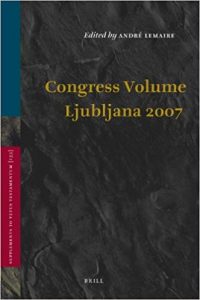A IOSOT – International Organization for the Study of the Old Testament ou Organização Internacional para o Estudo do Antigo Testamento – foi fundada em 1950 em Leiden, nos Países Baixos, com a finalidade de promover o estudo acadêmico do Antigo Testamento e áreas afins.
O XIX Congresso da IOSOT acontece em Liubliana (Ljubljana), Eslovênia, de 12 a 20 de julho de 2007. Vi os resumos (abstracts) das palestras do Congresso. Há coisas muito interessantes. Para mim, sobretudo as que tratam dos profetas. Jeremias comparece nas discussões!
Foi publicado um volume com as principais palestras:
LEMAIRE, A. (ed.) Congress Volume Ljubljana 2007. Leiden: Brill, 2009, xvi + 640 p. – ISBN 9789004179776.
Interessou-me, porém, a proposta de Ulrich Berges, da Westfälische Wilhems-Universität Münster, Alemanha, sobre o Dêutero-Isaías.
O autor faz um histórico da identificação deste texto (Is 40-55) e de seu anônimo autor como um profeta do exílio babilônico (586-538 a.C.) desde Döderlein, em 1788, passando por Eichhorn, até chegar a Duhm, em 1892. Sobre isto, escrevi alguma coisa aqui. Sua proposta, contudo, é de que nada no Dêutero-Isaías nos obriga a defender um só autor para o texto, como vem sendo feito desde então. Para ele, é bem mais provável um autoria múltipla destes capítulos: It is not an individual prophet that stands behind these chapters but rather a prophetically inspired group of trained literary craftsmen probably to be linked with exiled temple-singers.
A seguir, o abstract de Adeus ao Dêutero-Isaías ou profecia sem um profeta.
Farewell to Deutero-Isaiah or prophecy without a prophet
Until the end of the 18th century the authorship and the authority of Isaiah ben Amoz for the whole of the book of Isaiah were nearly uncontested. The situation changed with Johann Gottfried Döderlein (1746-1792), Johann Gottfried Eichhorn (1752-1827) and especially with Bernhard Duhm (1847-1928). While the first of these reckoned with an anonymous exilic author for the chapters Is 40-66 [40-52 in the case of Eichhorn], the third one promoted and developed that idea by separating chapters 56-66 and by the invention of the artificial names Deutero- and Trito-Isaiah respectively. Whereas the idea of a personality behind Isa 56-66 never reached global acceptance, the invention of a prophetic persona behind Isa 40-55 was accepted to such an extent that it became the general opinion for the last hundred years. Despite some few critics the hypothesis obtained the status of an unchallenged certainty and the anonymous exilic prophet was considered “in persona” as the high point of Hebrew poetry and theology. But the points of criticism remained valid and were never sufficiently answered. Why didn’t the biblical tradition conserve the name of such a prominent figure? If this prophet even died in jail or was martyred (cf. Isa 53), why has that not been remembered by his disciples and followers? If a collective authorship for Isa 56-66 is widely admitted in our time, why isn’t the same acceptable for Isa 40-55? It has to be stressed that no prophetic “I” is found in these chapters. In 40,6 the massoretic text has to be followed and 48,16c is clearly a late addition. The first person singular in the second and third Ebed songs (49,1-6; 50,4-9) can’t be used either to fill this biographical vacuum. There is simply no prophetic persona present who acts by words and deeds but rather the one and only prophetic voice of Isaiah ben Amoz that reverberates in the whole book. The great variety of literary forms in these chapters ought not to be seen as a sign of an originally historical activity of the anonymous prophet, since the literary structure of the individual chapters is much stronger than normally acknowledged. From the point of view of redaction criticism the arguments and criteria for the separation of a deutero-isaianic “Grundschrift” turn out to be so disparate that not even a minor consensus has been achieved. The different proposed “Grundschriften” in fact result in quite different personalities of the anonymous exilic prophet. The alternative solution lies at hand: it is not an individual prophet that stands behind these chapters but rather a prophetically inspired group of trained literary craftsmen probably to be linked with exiled temple-singers. The allusions and connections to the traditions of the Psalms, the book of Lamentation, the priestly stratum, the word-theology of Deuteronomy among others do point in that direction.